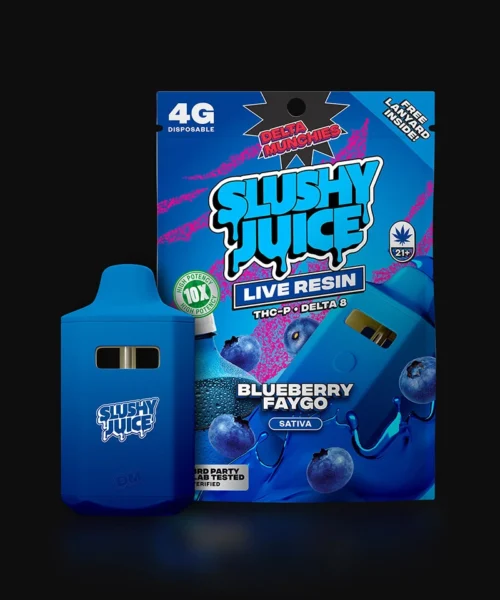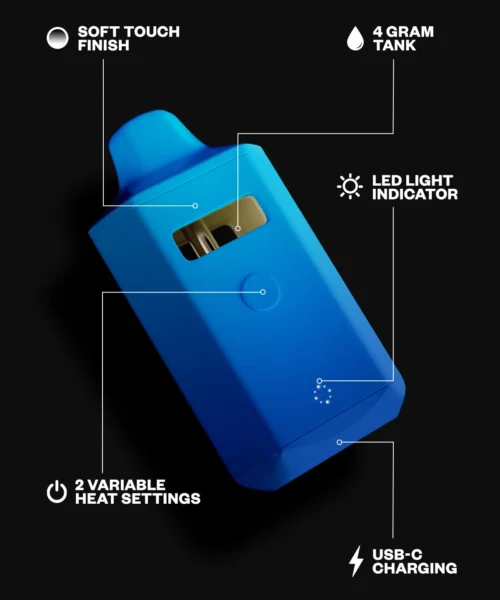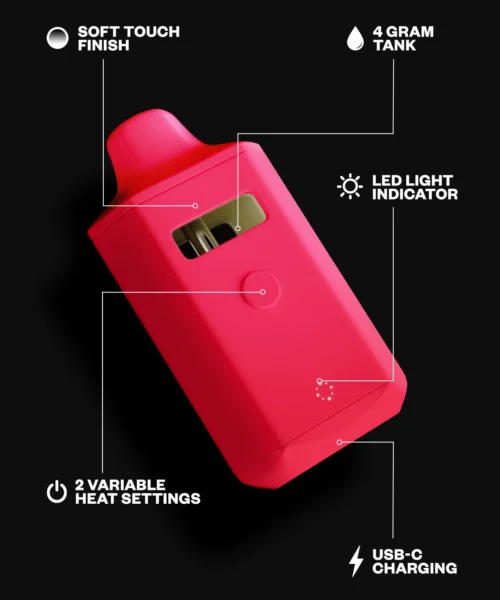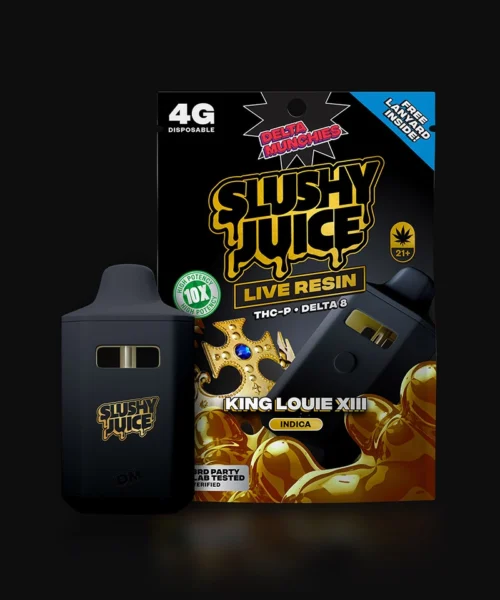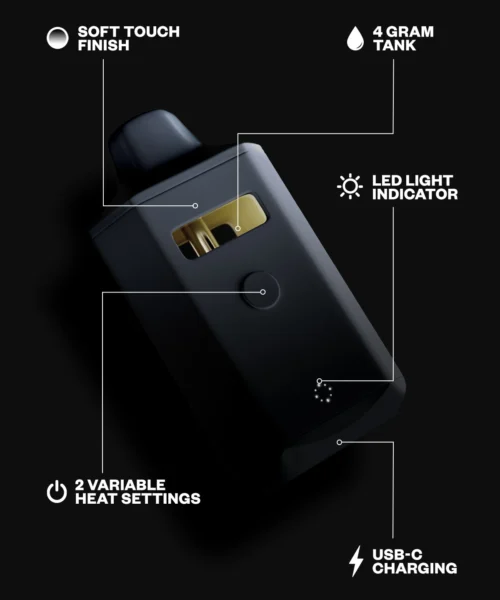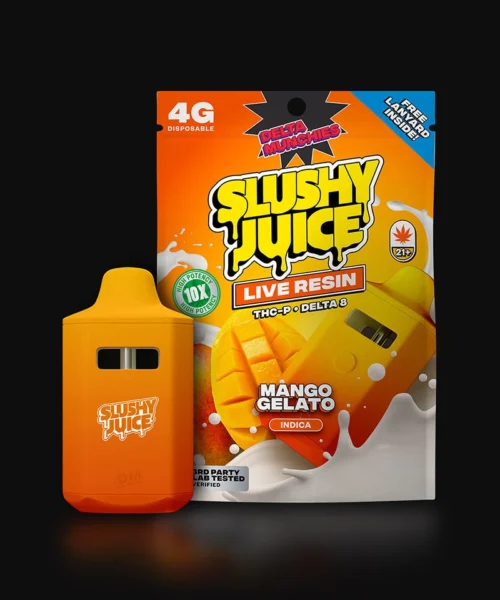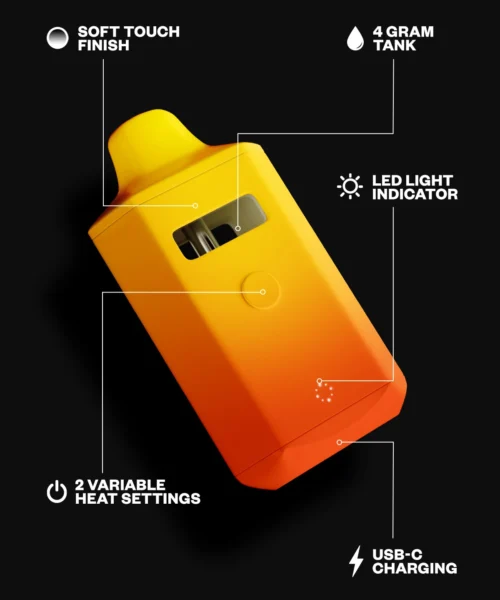The world of cannabinoids seems to have no shortage of players, as new players are always joining the game, promising unique experiences and intriguing effects. Among these emerging stars are delta 8 THC and THC-P, two lesser-known cannabinoids capturing the attention of cannabis enthusiasts and researchers alike.
THC-P vs. delta 8 is an interesting comparison because both cannabinoids are steadily gaining a lot of attention in the cannabis world. In this article, we explore how they are both similar yet different.
So, let’s get into it.
Want to try both? Check out our new line of 4G THC-P and delta 8 disposables!
Live Resin • THC-P • Delta 8 Vape
$49.99
featured products 2
$49.99
Live Resin • THC-P • Delta 8 Vape
$49.99
Live Resin • THC-P • Delta 8 Vape
$49.99
Key Takeaways
- THC-P and delta 8 are both cannabinoids that occur naturally in hemp plants.
- While delta 8 has generally been on the scene for a while, THC-P is the more recent arrival that has been stirring things up.
- THC-P may be considerably more potent than delta 8 in terms of its psychoactive effects.
- Both cannabinoids occur in trace amounts and have to be artificially synthesized.
Delta 8 vs. THC-P
We’ll compare these two cannabinoids based on four different points — reported effectiveness, effect significance, extraction process, and compound structure.
Delta 8 vs. THC-P: Reported Effectiveness
One of the first things you should note about delta 8 and THC-P is that they are both psychoactive. But which of them yields the more potent effect?
You’re probably no stranger to delta 8 and likely already know it produces psychoactive properties. However, delta 8 is typically referred to as the milder cousin of delta 9 because of its lower potency. This means delta 8 is only mildly intoxicating compared to delta 9. As a result, it is ideal if you don’t want very intense high experiences.
On the other hand, THC-P is a cannabinoid recently discovered by scientists and there’s still not a lot of information about it. However, research from the original team that discovered it suggests that THC-P is psychoactive and very potent.
According to some experts, THC-P can bind with the CB1 receptors in the body 33 times more than THC. Therefore, it is expected to be far more potent than delta 9 THC, much less than delta 8.
In summary, as it currently stands, THC-P is considered more potent than delta 8 in terms of its psychoactive effects.
THC-P vs. Delta 8: Effect Significance
The implication of the effects of delta 8 and THC-P on users’ behavior is another interesting point for comparison.
For instance, due to its mild psychoactive effects, new users and users seeking something “light” would typically opt for delta 8 over THC-P. However, if you’re looking for a more intense high experience, then you can consider THC-P.
However, like every other cannabinoid, it is important to exercise caution when trying THC-P for the first time. Take it slow and start with smaller doses to ensure that your tolerance level is up to speed.
THC-P vs. Delta 8: Extraction Process
Both delta 8 and THC-P are naturally occurring cannabinoids, which means that they can be extracted from cannabis plants using pretty much the same process. This process involves harvesting, drying, curing, and extraction, typically consisting of using solvents, winterization, decarboxylation, and finally, isolation and purification.
However, it is important to note that both delta 8 and THC-P occur in trace or limited amounts in cannabis and hemp plants. As a result, they are often synthesized from more abundant compounds in the hemp plant.
For instance, manufacturers often produce delta 8 by converting CBD through an isomerization process as CBD is more abundantly available. In the same way, THC-P is also synthetically produced by manipulating CBD using chromatography and other methods.
Delta 8 vs. THC-P: Compound Structure
Although the extraction and production methods of delta 8 and THC-P are very similar, they still have quite different compound structures.
On the one hand, delta 8 is an isomer of delta 9; that means it has an identical chemical formula to delta 9. The only difference between them is the position of a double bond on the chain of carbon atoms. So, for delta 8 this double bond is on the eighth carbon atom, while for delta 9, the double bond is on the ninth carbon atom.
On the other hand, the molecular structure of THC-P is markedly different. THC-P has a more extended alkyl side chain (the “tail” of atoms that extends out from the bottom of the largest part of the molecule).
This means that THC-P has an oversized side chain with seven carbon atoms instead of delta 9’s five carbon atoms. However, you should note that its oversized side chain allows THC-P to bind more readily with human CB1 and CB2 cannabinoid receptors. As a result, its effects are likely more potent in the brain and body than delta 9 and delta 8.
What is Delta 8?
Delta 8 is a naturally occurring cannabinoid found in hemp and cannabis plants. However, it occurs in trace amounts in these plants and is usually synthesized from other natural compounds for mass production.
How is Delta 8 Made?
Since delta 8 occurs in trace amounts in hemp plants, many manufacturers do not make it by extracting it. Instead, they produce it in the lab.
Here’s a quick walkthrough of the process of making delta 8:
- First, they extract CBD from cannabis plants using any of the extraction processes, such as CO2 extraction or ethanol extraction.
- The next thing is the isomerization of CBD, which simply means the rearranging of specific molecules in CBD to form delta 8. Isomerization is usually done by exposing CBD to a catalyst, such as a metal or acid catalyst.
- After isomerization is done and delta 8 is formed, the next thing that will be needed is the purification of delta 8 from other impurities and unwanted compounds.
- The primary way to purify delta 8 is via chromatography. Chromatography is a separation technique that separates different compounds based on their chemical properties. Note that other separation techniques may be used as well.
- Lastly, testing the delta 8 product is crucial to ensure it is pure and safe.
What are the Effects of Delta 8?
Users of delta 8 have reported that it has similar effects to delta 9 THC, such as euphoria, relaxation, and pain relief. However, these effects are typically at a milder level. However, like delta 9, you’ll also find that delta 8 has some potential side effects like red eyes, dry mouth, paranoia, short-term memory, anxiety, etc.
It is important to note that most of these side effects are temporary and usually result from wrong dosages or low-quality products.
What are the Benefits of Delta 8?
There are several potential benefits that consuming delta 8 offers you. Here are some of the top ones:
- Pain relief
- Improved sleep
- Improved appetite
- Anti-inflammatory properties
- Anti-nausea
Best Ways to Take Delta 8
Here are some of the more popular methods people use to consume delta 8:
- Edibles: This essentially means ingesting delta 8 in food form. You can easily find delta 8 in the form of gummies and other edibles. One thing to note about gummies is that they take about 1-2 hours before their effects begin to kick in.
- Vaping: This is the fastest-acting of all the ways to use delta 8 THC. When you vape delta 8 THC it enters your system through your lungs and swiftly moves to your bloodstream.
- Tinctures: You take tinctures by placing them under your tongue. They also take about an hour before their effects kick in.
- Smoking: Smoking delta 8 is also a quick way to get its effects.
Note that the best way to take delta 8 may differ for each person based on what they need or prefer.
Best Delta 8 Strains
Unlike delta 9 THC, there are no established strains for delta 8. However, you can find delta 8 in various forms including, delta 8 gummies, delta 8 carts, and even pre rolls.
What is THC-P?
THC-P is a naturally occurring cannabinoid found in most cannabis plants. It is found in trace amounts and possesses a chemical structure quite different from THC.
THC-P was only discovered in 2019, and more research still needs to be done on it. However, experts believe it is more psychoactive and far more potent than delta 9 THC. Like some other cannabinoids, THC-P is also synthesized as it occurs in trace quantities naturally.
How is THC-P Made?
THC-P is synthetically produced at a commercial scale, and it is done by changing the molecular structure of CBD to convert it to THC-P. This requires equipment and processes that are typically in the possession of manufacturers.
What are the Effects of THC-P?
The research on THC-P is still minimal. However, it likely has the same side effects as other cannabinoids, such as red eyes, dry mouth, paranoia, etc.
Because it is deemed more powerful than THC, we advise caution when trying out doses, especially for new users of cannabis. Furthermore, THC-P will generally induce psychoactive effects on the body, including feelings of euphoria and altered perception.
What are the Benefits of THC-P?
While research on the benefits of THC-P is still largely lagging, anecdotal evidence suggests that it may help with pain relief, sleep, and relaxation.
Best Ways to Take THC-P
Similar to taking delta 8, some of the best ways to take THC-P include:
- Smoking
- Vaping
- Tinctures
- Edibles
Best THC-P Strains
THC-P is still not categorized into strains. However, you can find it in different types of products, which offer you multiple options for consuming it.
Delta 8 vs. THC-P: Which is Right for You?
There is no one-size-fits-all answer to this, as it depends on your preferences as an individual. If you are looking for a mild high, then delta 8 may be the ideal choice. However, if you want an intense high experience, then you should consider trying THC-P.
However, you should ensure that your tolerance level is up to par with the potency of the product you’re trying. Otherwise, take things very slowly.
Delta 8 vs. THC-P: Effects
While the research on THC-P is still on, both cannabinoids seem to have very similar effects, both in terms of “high” and side effects. However, it is essential to note that THC-P is expected to be more intense than delta 8 because it binds more strongly with CB1 receptors.
Delta 8 vs. THC-P: Potency
THC-P is far more potent than delta 8 THC, at least according to the latest research. Some experts say that it may be 33-60 times more potent than delta 8, while others say it may be a little less than these. Either way, the general consensus is that THC-P delivers a more potent high than delta 8 THC.
Where to Buy the Best Delta 8 and THC-P Products Online
If you are looking to buy delta 8 or THC-P products that are quality and safe, Delta Munchies is where to look. We just launched our new line of Slushy Juice vapes! These 4G disposables combine THC-P and delta 8 with live resin made from fresh frozen plants to preserve their terpene and flavonoid profile. The result is a hard-hitting, highly flavorful vape.
Live Resin • THC-P • Delta 8 Vape
$49.99
featured products 2
$49.99
Live Resin • THC-P • Delta 8 Vape
$49.99
Live Resin • THC-P • Delta 8 Vape
$49.99
Final Thoughts
THC-P and delta 8 are both naturally occurring cannabinoids with much in common. However, they also have several distinctive differences, especially in their potency and chemical makeup.
Delta 8 vs. THC-P: FAQs
Is THC-P as Strong as Delta 9?
THC-P is believed to be stronger than delta 9 because it binds more with CB1 receptors
Is THC-P the Most Potent?
THC-P is the most potent cannabinoid when compared to delta 8 and delta 9 THC
What are the Benefits of THC-P?
One of the core benefits of THC-P is that it is potentially a source of pain relief. Others include anti-inflammatory properties and stress-relieving properties.
Is THC-P the Same as CBD?
No, THC-P is not the same as CBD, but THC-P can be made from CBD.
The post THC-P vs. Delta 8 appeared first on Delta Munchies.


